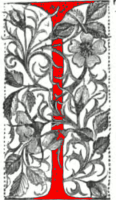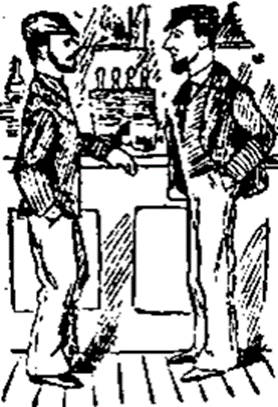This article has been transcribed from a copy of the Cardiff Times in the online collection of scanned Welsh newspapers 1804-1919 in the National Library of Wales, with grateful recognition of the free access accorded to all readers. A decorative initial has been added, and where needed paragraph breaks have been introduced for easier reading.
As so often, this writer of 'Samuel's Sentiments' claims that there are categories of women and working-class men who behave badly.
'detail bordered imitation' is presumably a reference to the black-bordered writing paper that was mandatory in condolences and mourning in the period; 'imitation' may be a misprint for 'invitation', but 'detail bordered' seems to make no sense.
'smooth many of the rough places' is from Isiah 40:4: 'every … mountain and hill shall be made low … and the rough places plain' —— David Skilton

have never yet been able to decide definitely in my own mind whether sympathy, as met with in the work-a-day world, is an evil or a blessing. That the silent sympathy which tells of genuine sorrow, and surrounds a desire to help those in trouble, is indeed a blessing and a joy I know full well; but it is of the every-day or on-'Change species of sympathy with which I propose to deal in the present article. I am strongly inclined to the belief that such sympathy is neither more nor less than an emphatic and objectionable nuisance. Sympathisers of this type are terribly fond of detail, and when they offer their condolence to any friend in trouble they insist upon being supplied with all the details of cause and effect. Should any friend lose a dear relative they at once offer their sympathy, and at the same time extract from the sorrowing relatives the whole history of the illness and the minutiæ of the death-bed. It never seems to dawn upon them that they are opening wounds afresh and dragging at the heart-strings of their friends by their insatiable and unmannerly curiosity. Yet such is their mental construction that they would imagine their sympathy poor and feeble were it not accompanied by a fire of cross questions of the most painful order. Surely people who lose those dearest to them suffer sufficient pain during the tension of the last dread moments, when the fell sergeant is waiting for his victim, without having to retail the details of the scene for the benefit of inquiring acquaintances, whose sympathy is all form and ceremony, and who know no more of the blessing of the reality they mock than they know how to fly from London to Paris.

Honest sympathy.
It is only fair to say that the principal offenders in this direction are ladies. I need hardly say that all ladies are not of this class, and the true sympathy of a good woman brings with it a solace beyond compare. There are to be found many women who devote their lives to deeds abounding with sympathy, and they leave behind them sunlight and peace wherever they go. When a man meets one of his fellows who is in trouble he grasps him by the hand and in a few simple words expresses his sorrow. Yet there is more real sympathy expressed by that shake of the hand than could be found in a whole collection of the detail bordered imitation [of mourning stationery]. Some women not unfrequently feign a sympathy they do not in reality possess for the mere pleasure of knowing they have as much information relative to certain cases as their friends' and neighbours. This is merely the outcome of jealousy

Professional sympathy.
When a man offers his sympathy to a friend it is generally real. Men live too quickly now-a-days to be able to waste their time on mock sympathy. If people really knew the worth of true sympathy, they would soon desist from a form of so-called sympathy that is neither more nor less than a desire to gratify vulgar curiosity under the guise of sorrow. A phase of sympathy that does much harm and leads to real acts of charity being thwarted is that of the amateur district visitor, whose sympathy usually takes the form of advice, backed up by tracts. If district visitors, vicars and curates were more practical and less talky in their sympathetic efforts they would pluck more brands from the fire and leave more joy in lonely homes than they do at present. Tracts and advice are no solace to a starving family, and it is disgust at such sympathy that leads to the little frauds so often indulged in for the purpose of obtaining sympathy of a more practical order. More practical sympathy and less cant is what is wanted in the places where the district visitor is most needed. Occasionally sympathy has its humorous side, and the results produced are ludicrous in the extreme. Say, for instance, two artisans meet, both of whom are good natured fellows, and begin to discuss the loss of the mother-in-law of one of them. Now it is popularly supposed that the loss of a mother-in-law is a thing not to be regretted, and when artisan number one begins the stereotyped tale of sympathy, it is only to discover that his chum does not seem to be overwhelmed with sorrow at the departure to another world of his relative. So much so, that sympathy gives way to congratulation and an adjournment to the nearest hostelry, there to drink to the eternal peace of the defunct lady. So perfectly do they desire the lady shall rest that at the end of their imbibing they are in that peculiar state [k]nown as 'jolly,' and are quite prepared to go on wishing well to any quantity of departed mothers-in-law.


Left: Bibulous sympathy. Right: [caption illegible]
Strange as it may appear, the purest and truest sympathy is to be found among animals, and far from few are the cases where dogs have shown it in its highest form, even to the extent of pining unto death for a well-loved master or mistress. It is most interesting to watch dogs and their sympathetic ways, for in spite of their dumbness there is a distinct expression of sorrow conveyed by the expression of their faces. As lovers tell unspoken tales with their eyes, so dogs convey their sympathy, and it is no exaggeration to say that the tears of sorrow are to be seen in the eyes of dogs when they watch and wait for the master who will come no more.
If the people whose sympathy I have objected to would but note what its value is, and be more genuine, they would smooth many of the rough places of the world[ii] and would support and encourage such of their fellows as were in trouble.
Links to Related Material
Last modified 9 April 2022